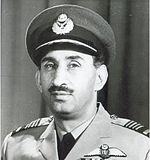Awan (tribe)
| Awan اعوان | |
|---|---|
| Ethnicity | Punjabi (incl. Hindkowans) |
| Location | Punjab, Sindh and Azad Kashmir |
| Language | Punjabi, Hindko |
| Religion | Islam |
Awan (Punjabi and Urdu: اعوان) is a Punjabi Muslim community and surname originating from the Punjab region of Pakistan. Awans are predominantly present in the northern, central, and western parts of Punjab, with significant population also present in Khyber Pakhtunkhwa, Azad Kashmir, and to a lesser extent, in Sindh and Balochistan.
History
Jamal J. Elias notes that the Awans believe themselves to be of Arab origin, descended from Ali ibn Abu Talib and that the claim of Arab descent gives them "high status in the Indian Muslim environment".[1] However, they are also described as having Jat origins.[2]
Christophe Jaffrelot says:
The Awan deserve close attention, because of their historical importance and, above all, because they settled in the west, right up to the edge of Baluchi and Pashtun territory. Legend has it that their origins go back to Imam Ali and his second wife, Hanafiya. Historians describe them as valiant warriors and farmers who imposed their supremacy on the Janjua in part of the Salt Range and established large colonies all along the Indus to Sind, and a densely populated center not far from Lahore.[3]
People of the Awan community have a strong presence in the Pakistani Army[4] and a notable martial tradition.[5] They were listed as an "agricultural tribe" by the British Raj in 1925, a term that was then synonymous with classification as a "martial race".[6]
Notable people


- Nawab Malik Amir Mohammad Khan – Former Nawab of Kalabagh, Chief of the Awan tribe and Governor of West Pakistan from 1960 to 1966.[7]
- Air Marshal Nur Khan – Commander-in-chief of the Pakistan Air Force, 1965–69, Governor of West Pakistan, 1969–70, and recipient of the Hilal-i-Jurat, the second-highest military award of Pakistan.[8]
- Tajammul Hussain Malik, War Hero of the Indo-Pakistani War of 1965, held an impenetrable defence in the Battle of Hilli against a multiple times larger force, famously refused to surrender and attempted coup against the Military Dictatorship of the 1980s
- Mir Sultan Khan – A chess master also believed by some to be the greatest natural chess player of modern times.[9]
- Ahmad Nadeem Qasmi – Urdu poet, journalist, literary critic, dramatist, short story author, recipient of the Pride of Performance and Sitara-e-Imtiaz, the third-highest civil award of Pakistan.[10]
- Sultan Bahu – A Sufi mystic, poet, scholar and founder of mystic tradition known as Sarwari Qadiri.[11]
- Khadim Hussain Rizvi – A Pakistani Islamic scholar and the founder of Tehreek-e-Labbaik Pakistan.[12]
- Ameer Muhammad Akram Awan – Islamic scholar and spiritual leader of the mystic tradition known as Naqshbandia Owaisiah.[13]
- Saad Hussain Rizvi, Pakistani politician
- Abdul Mannan Wazirabadi – Islamic scholar, jurist and muhaddith.[14][better source needed]
- Dilip Kumar – An actor in Hindi cinema.[15]
- Babar Awan - Pakistani politician and lawyer
- Hardev Bahri - linguist who wrote a two volume thesis on the Awankari dialect
See also
References
- ^ J. Elias, Jamal (1998). Death Before Dying: The Sufi Poems of Sultan Bahu. University of California Press. p. 12. ISBN 978-0-52021-242-8.
- ^ Khan, Sabir Badal (2013). Two Essays on Baloch History and Folklore: Two Essays on Baloch History and Folklore. Università di Napoli, "l'Orientale". p. 40.
- ^ Jaffrelot, Christophe (2004). A History of Pakistan and Its Origins (Reprinted ed.). Anthem Press. p. 205. ISBN 978-1-84331-149-2.
- ^ Jones, Philip Edward (2003). The Pakistan People's Party: Rise to Power. Oxford University Press. p. 61. ISBN 0195799666.
This [Awan] tribe is perhaps the most heavily recruited tribe in the [Pakistan] Army.
- ^ Ali, Imran (1998). Punjab under Imperialism, 1885–1947. Princeton University Press. p. 114. ISBN 1400859581.
- ^ Mazumder, Rajit K. (2003). The Indian Army and the Making of Punjab. Orient Longman. p. 105. ISBN 9788178240596.
- ^ Khan, Jahan Dad (2001). Pakistan Leadership Challenges. Oxford University Press. p. 72. ISBN 0195795873.
- ^ Khan, Roedad (1999). The American Papers: Secret and Confidential India-Pakistan-Bangladesh Documents, 1965-1973. Oxford University Press. p. 265. ISBN 0195791908.
- ^ Sultan, Ather; Sultan, Atiyab (17 May 2020). "CHESS:The Wrath of Khan". Dawn. Retrieved 12 June 2020.
- ^ Kamal, Daud (2008). Flower on a Grave: Poems from Ahmad Nadeem Qasimi. Oxford University Press. ISBN 9780195474978.
- ^ Frembgen, Jürgen Wasim (2006). The Friends of God: Sufi Saints in Islam, Popular Poster Art from Pakistan. Oxford University Press. p. 103. ISBN 0195470060.
... Sultan Bahu (d. 1691) whose real name was Sultan Muhammad. Born into an Awan Family in Shorkot (District Jhang), ...
- ^ Warraich, Suhail (10 December 2017). "A Barelvi revival?". The News International. Islamabad. Retrieved 24 January 2021.
- ^ "Hazrat Ameer Muhammad Akram (RA)". Silsala Naqshbandia Owaisia. Retrieved 3 January 2021.
- ^ Ustad-e-Punjab (teacher of Punjab), in Urdu Language, by Maulana Majeed Sohadravi, Darussalam Pakistan/Muslim Publication, Lahore. page 41
- ^ Web Team, WION (8 July 2021). "Pakistan mourns the loss of legendary Indian star Dilip Kumar, prayers offered outside ancestral home". WION. New Delhi, India. Retrieved 13 July 2021.
Further reading
- Qadeer, Mohammad (22 November 2006). Pakistan - Social and Cultural Transformations in a Muslim Nation. Taylor & Francis. p. 71. ISBN 1134186177.
